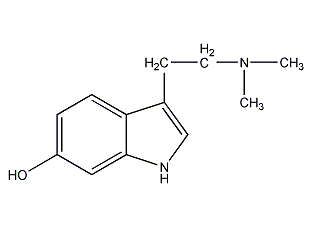N,N-dimethylcephalin


Structural formula
| Business number | 053J |
|---|---|
| Molecular formula | C12H16N2O |
| Molecular weight | 204.27 |
| label |
N,N-dimethylcephalin, Bufotryptamine |
Numbering system
CAS number:487-93-4
MDL number:None
EINECS number:207-667-9
RTECS number:None
BRN number:None
PubChem ID:None
Physical property data
1. Character: Undetermined
2. Density (g/ m3,25/4℃): Undetermined
3. Relative vapor density (g/cm3,AIR=1): Undetermined
4. Melting point (ºC): Undetermined
5. Boiling point (ºC,Normal pressure): Undetermined
6. Boiling point (ºC,5.2kPa): Undetermined
7. Refractive Index: Undetermined
8. Flash Point (ºC): Undetermined
9. Specific optical rotation (º): Undetermined
10. Autoignition point or ignition temperature (ºC): Undetermined
11. Vapor pressure (kPa,25ºC): Undetermined
12. Saturated vapor pressure (kPa,60ºC): Undetermined
13. Heat of combustion (KJ/mol): Undetermined
14. Critical temperature (ºC): Undetermined
15. Critical pressure (KPa): Undetermined
16. Oil and water (octanol/Water) logarithm of the partition coefficient: not OK
17. Explosion limit (%,V/V): Undetermined
18. Lower explosion limit (%,V/V): Undetermined
19. Solubility: Undetermined
Toxicological data
Acute toxicity: human intravenous TDLo: 57ug/kg, Peripheral nerves and sensation –Sensory changes involve peripheral nerves, lungs, Chest or respiratory–Other changes Gastrointestinal–Other changes;
Mouse transperitoneallyLD50: 290mg/kg, no details except lethal dose;
Mouse transvenousLD50: 25mg/kg, no details except lethal dose;
Frog Parenteral LDLo: 2500mg/kg, except for lethal doses No detailed explanation.
Ecological data
This substance may be harmful to the environment, and special attention should be paid to water bodies.
Molecular structure data
1、 Molar refractive index:62.94
2、 Molar volume(m3/mol):173.3
3、 Isotonic specific volume (90.2K): 467.5
4、 Surface tension(dyne/cm):52.8
5、 Polarizability(10-24cm3):24.95
Compute chemical data
1. Reference value for hydrophobic parameter calculation (XlogP): None
2. Number of hydrogen bond donors: 2
3. Number of hydrogen bond acceptors: 2
4. Number of rotatable chemical bonds: 3
5. Number of tautomers: 9
6. Topological molecule polar surface area 39.3
7. Number of heavy atoms: 15
8. Surface charge: 0
9. Complexity: 208
10. Number of isotope atoms: 0
11. Determine the number of atomic stereocenters: 0
12. Uncertain number of atomic stereocenters: 0
13. Determine the number of chemical bond stereocenters: 0
14. Number of uncertain chemical bond stereocenters: 0
15. Number of covalent bond units: 1
Properties and stability
Use and store according to specifications, will not decompose, and avoid contact with oxides
Storage method
Seal and store in a ventilated, dry environment
Synthesis method
None
Purpose
None